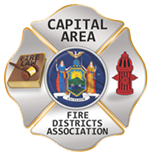Compliments of Fire District Affairs
The State Association’s Counsel answers many inquiries on the Unappropriated Unreserved Fund Balance which in simple terms is the money that remains in the operating account after fiscal year’s transactions are completed. The fire district fiscal year is the calendar year. It starts on January 1st and ends on December 31st. The Board adopts and files a final budget for the next fiscal by Novembers 7th and in the next year relies upon the county and town to raise and turnover that money during the next fiscal year so that the fire district can operate in that next fiscal year.
From year-to-year fire districts end up with surpluses if they do not spend all the year’s operating funds and those funds carry over into the next year in the accounts until a decision is made either to transfer that money to reserve funds or use it to reduce a future year’s budget.
The process would be straightforward if, at the start of each year, the operating budget funds for that year were immediately placed into the fire district’s operating account. However, we know this is not the case. There is a taxpayer payment process that unfolds over the year, resulting in the necessity to utilize funds from the Unappropriated Unreserved Fund Balance until the tax receipts are received.
The funds that are retained in the Unappropriated Unreserved Fund Balance can result in criticism if an excessive amount of money is retained in that account. We have seen reference to maintaining two months of operating money in that account to make it through the weeks and months that a fire district waits for its real property tax revenue collected for that operating year. Clearly, that might change if a particular district experiences longer delays in the receipt of its real property tax revenue for the current operating year.
Boards of Fire Commissioners should monitor cash flow from year to year and develop a policy on the level of Unappropriated Unreserved Fund Balance to be maintained.
The Town Law does address the concept of Unappropriated Unreserved Fund Balance:
(b) On or before the last date provided by law for the adoption of the proposed budget, the board of fire commissioners shall prepare an estimate of the fund balance which shall be affixed to the proposed budget as an appendix thereto. The estimate of fund balance shall include a breakdown of such fund balance estimated for encumbrances, amounts estimated to be expended for the ensuing fiscal year, amounts reserved for stated purposes pursuant to law, including reserve funds established pursuant to the general municipal law, and the remaining unappropriated unreserved fund balance as that term is defined in section one hundred three of this chapter, provided that the remaining estimated unappropriated unreserved fund balance for each fund shall not exceed a reasonable amount, consistent with prudent budgeting practices, necessary to ensure the orderly operation of the fire district and the continued provision of services, taking into account factors including, but not limited to, the size of the fund, cash flows, the certainty with which the amounts of revenues and expenditures can be estimated, and the fire district’s experience in prior fiscal years. For those districts which employ the cash basis of accounting, fund balance means the cash surplus estimated to be on hand at the close of the current fiscal year less claims payable therefrom and amounts reserved pursuant to law for stated purposes, including reserve funds established pursuant to the general municipal law. N.Y. Town Law § 181 (McKinney)
The definition of the term in Town Law §103 states as follows:
“Unappropriated unreserved fund balance” shall mean the difference between the total assets for a fund and the total liabilities, deferred revenues, encumbered appropriations, amounts appropriated for the ensuing fiscal year’s budget, and amounts reserved for stated purposes pursuant to law, including reserve funds established pursuant to the general municipal law for the fund, as determined through application of the system of accounts prescribed by the state comptroller pursuant to section thirty-six of the general municipal law. N.Y. Town Law § 103 (McKinney)
As far as managing and spending the Unappropriated Unreserved Fund Balance the applicable law states:
4. The board of fire commissioners, during a fiscal year, may make additional appropriations or increase existing appropriations. Moneys therefor may be provided by transfer from the unexpended balance of an appropriation, from unappropriated unreserved fund balance, or unanticipated revenues, or by borrowing pursuant to the local finance law. For the purposes of this subdivision, unappropriated unreserved fund balance or unanticipated revenues shall be available for transfer only to the extent that the total of all revenues recognized or reasonably expected to be recognized in the current fiscal year, including unappropriated unreserved fund balance, exceeds the total of all revenues as estimated in the budget, including appropriated fund balance. N.Y. Town Law § 181-a (McKinney)
Fire districts nearing their spending limits should be mindful that utilizing Unappropriated Unreserved Fund Balance for categories subject to the spending limitation could potentially lead to surpassing the limit in the current fiscal year. The Board and the treasurer should actively oversee and track this expenditure activity.
Setting a policy on maintenance and use of the Unappropriated Unreserved Fund Balance and following that policy is an important task for the Board and the treasurer.
________________________________________
